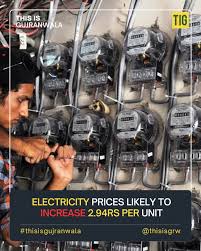The federal government of Pakistan recently announced an increase in the electricity tariff by Rs2.56 per unit as part of the fuel cost adjustment (FCA) for June 2024. This increase comes at a time when inflation and the rising cost of living have already burdened the masses. The new tariff will be reflected in the August bills, further straining the financial resources of consumers. However, there are exemptions for certain categories of consumers, including lifeline and K-Electric users.
Understanding the Fuel Cost Adjustment (FCA)
What is FCA? Fuel Cost Adjustment (FCA) is a mechanism used by power companies to adjust the price of electricity based on fluctuations in fuel prices. The adjustment is usually reflected in the consumers’ monthly bills and is subject to approval by the National Electric Power Regulatory Authority (Nepra).
Details of the Recent Hike On Thursday, the National Electric Power Regulatory Authority (Nepra) issued a notification approving the Electricity Bills Increase tariff by Rs2.56 per unit under the FCA for June 2024. The Central Power Purchasing Agency (CPPA) had initially requested a hike of Rs2.63 per unit, which was slightly reduced by Nepra.
Impact of the Tariff Increase
Financial Burden on Consumers The recent hike in electricity tariff will place an additional financial burden of Rs33.45 billion on consumers. With the imposition of an 18% General Sales Tax (GST), this burden will escalate to Rs39 billion. The increase is expected to have a significant impact on households, businesses, and industries already struggling with high inflation.
Exemptions for Lifeline and K-Electric Consumers While the tariff hike will affect most consumers, lifeline consumers and those served by K-Electric have been exempted. Lifeline consumers, typically low-income households using minimal electricity, will not see any change in their bills. Similarly, K-Electric, which serves the city of Karachi, is not subject to this particular tariff increase.
Public Response and Government’s Challenge
Public Outcry The announcement of the tariff hike has led to widespread protests and sit-ins across the country. The public, already grappling with rising costs, expressed strong dissatisfaction with the government’s decision. The inflated electricity bills, combined with heavy taxes, have become a major source of discontent among the masses.
Government’s Response In response to the mounting pressure from the public, the federal government has been exploring options to reduce electricity rates. Prime Minister Shehbaz Sharif’s administration had previously implemented a significant increase in the base tariff for domestic consumers, raising it to Rs48.48 per unit. However, in a bid to provide some relief, consumers using up to 200 units per month were exempted from the increase for three months.
Broader Implications of the Tariff Increase
Impact on Various Sectors The recent increase in electricity tariffs is not limited to domestic consumers. The power regulator also approved hikes for commercial, general services, bulk, and agricultural consumers. This move is expected to affect a wide range of sectors, from small businesses to large industries, further exacerbating the economic challenges faced by the country.
Relation to IMF Program The government’s decision to Electricity Bills Increase is closely linked to its efforts to secure a fresh program from the International Monetary Fund (IMF). The tariff hike is part of a broader strategy to improve Pakistan’s chances of obtaining financial assistance from the IMF. The country recently reached a three-year, $7 billion bailout agreement with the IMF, which is expected to help stabilize the economy.
Government’s Efforts to Secure IMF Support
Bailout Agreement The recent tariff hike is one of several measures taken by the government to meet the conditions set by the IMF for the new bailout program. The $7 billion agreement, which is yet to be approved by the IMF’s Executive Board, is intended to help Pakistan achieve macroeconomic stability and create conditions for stronger, more inclusive, and resilient growth.
Endorsement by Federal and Provincial Governments Both the federal and provincial governments have endorsed the new IMF program, recognizing it as a necessary step to stabilize the economy. The government’s willingness to implement difficult reforms, such as increasing electricity tariffs, demonstrates its commitment to securing the financial assistance needed to navigate the current economic crisis.
Conclusion
The recent Electricity Bills Increase by the federal government is a significant development that will have wide-ranging implications for consumers across Pakistan. While lifeline and K-Electric consumers have been exempted, the majority of households and businesses will face higher electricity bills, adding to their financial burdens. The government’s decision to raise tariffs is closely linked to its efforts to secure a new IMF bailout program, which is seen as essential for stabilizing the economy. However, the move has sparked public outrage and highlighted the challenges faced by the government in balancing economic reform with the need to provide relief to the public.


